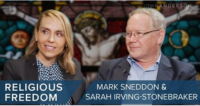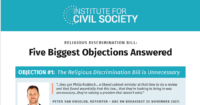In early May, the Victorian Parliament debated proposed legislation which would see the tax-exempted status of many faith-based organisations revoked. Mark Sneddon and ICS were closely involved in assessing the bill, consulting with parliamentarians, and providing commentary on the potential consequences of the new laws.
Below are extracts from the debate which cite Mark’s important contribution.
Legislative Council, Parliament of Victoria
Wednesday, 9 May, 2018
CHARITABLE ORGANISATION TAX EXEMPTION
Ms Fiona Patten , MLC:
“I move:
That this house notes that —
(1) many for-profit businesses are avoiding certain Victorian taxes by claiming charitable status, despite not engaging in objectively charitable work;
(2) principally, the businesses engaged in this avoidance are owned by religious institutions and take advantage of the charitable head of ‘advancement of religion’ to receive charitable tax exemptions despite operating as for-profit businesses and not carrying out objectively charitable works;
(3) the definition of charity for the purposes of Victorian statute should be redefined to protect genuinely charitable organisations and ensure that for-profit businesses pay their fair share of Victorian taxes;
(4) none of the above refers to the genuine charitable works of religious-run organisations or the usual activities conducted at a place of public worship;
and calls on the government to adopt into Victorian law the exposure draft of the Charities Amendment (Charitable Purpose) Bill 2018 as a modern and fair solution to this issue.”
Mrs Inga Peulich, MLC:
“… The bill seeks to do three things: one, it seeks to remove the advancement of religion as a charitable purpose for charity law; two, it expands the concept of disqualifying purposes that will take charities outside the law of charity; three, it removes tax exemptions that go further than the stated purpose of the bill. Let me just talk about the first one, about the removal of the advancement of religion as a charitable purpose. I have the advice of Mark Sneddon, who, as I said before, is an adjunct professor of law at Monash University and former Crown counsel, advisings, to the Victorian Attorney-General. He argued here in this chamber that:
The original charitable purposes in English have never been cut back since they were codified in the Statute of Elizabeth in 1601 (and the purposes of advancing religion was a charitable purpose in the common law before 1601). The bill however will take one of these purposes out and there is no policy justification for doing this. The impact of the bill if passed will be quite significant under trusts law. In general, trusts must end at most 80 years after their creation at which time the property in the trust must vest. Charitable purpose trusts can continue in perpetuity. Funds and property held on trust for the benefit of a mosque or synagogue or for the training of priests or imams can continue to be held in perpetuity for that purpose. Once the advancement of religion is no longer a charitable purpose in Victorian law, a trust for the advancement of religion becomes subject to the rule against perpetuities and must vest at 80 years…
This is the advice of an adjunct professor of law at Monash University, and I am sorry, Ms Patten, but I would prefer to take his advice than yours when it comes to law. He went on to say:
There are thousands of charitable religious purpose trusts in Victoria. If charities for the advancement of religion are no longer charitable because of this bill, what happens to the funds and property currently held in those trusts? For those trusts that have run past the perpetuity period of 80 years, the assets of the trusts are required to vest. Who do they vest in? How is that done? The bill provides no answers as to what happens in this situation.
According to Mark Sneddon:
The bill creates a mess without providing answers or even thinking about some of these key questions. There will be perverse consequences under the Victorian Charities Act. Important powers of trustees of charitable trusts are set out in parts 1A & 1B of the Charities Act. If the bill is passed, the trustees of religious purpose trusts will not have these powers anymore because they are not charitable trusts. The power of the Attorney-General to investigate the conduct of religious advancement trusts will end because the trust is no longer a charitable trust. The powers of the Supreme Court in relation to charitable trusts will not apply to religious advancement trusts because they are no longer charitable. There are other non-obvious consequences. Because the bill changes the definition of charitable purpose for all Victorian laws, it affects the meaning of the term charity in every Victorian act —
not just this one but every Victorian act —
For example, provisions about local government rates or services in relation to charities in the Local Government Act will no longer apply to religious advancement trusts.
He went on:
To say this bill is half-baked is a compliment. The bill will create a profound inconsistency in the law of charity in Australia. The federal Charities Act retains advancement of religion as a charitable purpose. Every other state and territory retains advancement of religion as a charitable purpose. What is going to happen to a charity that operates in Victoria and which is also registered under federal charities law? For Victorian law, assets will vest but not under federal law. How will the ACNC regulate charities operating in Victoria that are religious charities if this bill gets up?
If indeed that is what Ms Patten is calling for. According to Mark Sneddon:
Restriction of tax exemptions is much greater than advertised. The bill goes vastly further than the stated purpose of Fiona Patten, MLC, when introducing the bill which is to tax commercial businesses operated by religious charities. If the bill comes in and you are a big enough charity like Sanitarium, you will move outside Victoria. The bill in removing tax exemptions for religious bodies does not limit the removal to commercial businesses operated by a religious body. A religious organisation doesn’t have to be running a commercial business to lose your tax exemption under the bill.
And this is the most disturbing part. If, for example, you take bookings in your church hall for weddings or funerals or if there was a car park shared between a school and a church, the church could lose its charitable status overnight and be eligible for the payment of millions of dollars for tax exemptions that have been granted in the past. In addition to that, if a charitable institution backs a particular political candidate, they could deem themselves to lose that charitable status virtually overnight. This is a way of financially and politically nobbling any organisation that is against the very perverse agenda that Ms Patten continues to advocate: the establishment of drug injecting rooms, the establishment of a euthanasia regime, the legalisation of LSD and the legalisation of ice, and of course she thinks that bikie gangs are hard done by. That is why these institutions, which I guess are the defenders of values, are Ms Patten’s target, and she chooses to use her considerable clout with this government in order to get her own way.
At the end of the day Ms Patten probably does not even mind whether this motion is voted on or not, because she intends to use her power to pursue that agenda. My greatest concern is that if this government were returned, and if it was a minority government that relied on the support of people like Ms Patten and the Greens to form government, this indeed would become law, this would be a reality. I give a big shout out to our faith communities out there — our religious organisations, religious schools, Catholic and independent schools and Jewish schools — and say there is no greater threat to your existence than people like Ms Patten and the Greens. Mark Sneddon goes on to say:
All religious institutions will pay payroll tax and land tax and stamp duty regardless of whether they run a commercial business unless they fit within an exemption. There is a mismatch between the stated purpose of the bill and its actual effect. One exemption to the proposed application of land tax to religious bodies is to exempt places used exclusively for public worship. But most land occupied by churches, mosques, temples and synagogues is not used exclusively for public worship (e.g. it is used for community groups, new mothers’ groups, men’s sheds, dances, religious administration, youth groups et cetera) and so the exemption in practice may be illusory.
They are the very considered thoughts of an eminent and well-respected lawyer who we had the privilege of hearing from.”
Dr Rachel Carling-Jenkins, MLC:
“… As Mark Sneddon from the Institute for Civil Society, who was extensively quoted by Mrs Peulich, stated in summary on this bill:
The bill seems to not be thought through. It will create a profound mess in the law of charity…To say this bill is half-baked is a compliment.
The bill promoted in this motion purports to continue to exempt from land tax a ‘place of public worship’, defined as ‘a building or place that is open to the public for attendance and used for the purpose of religious worship by a religious group’. However, the exemption would only apply in relation to a place used [exclusively] as a place of public worship.”








Recent Comments